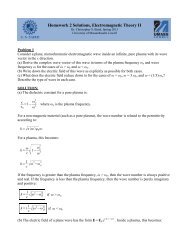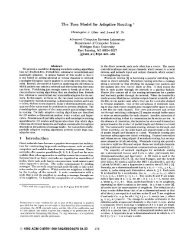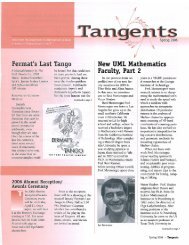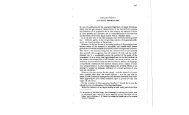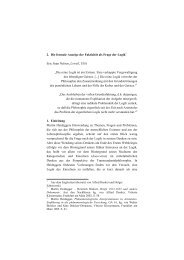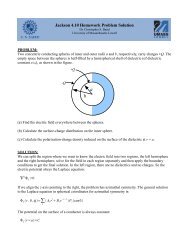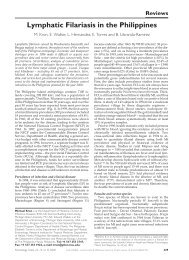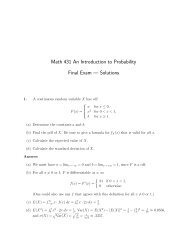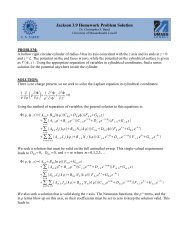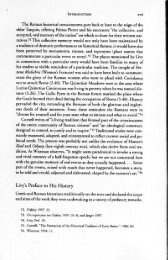CP13.2%20Futrell.%20Seeing%20Red
CP13.2%20Futrell.%20Seeing%20Red
CP13.2%20Futrell.%20Seeing%20Red
Create successful ePaper yourself
Turn your PDF publications into a flip-book with our unique Google optimized e-Paper software.
11.. Alison Futrell<br />
26. From "Trotz Alledem!" an article that originally appeared in Die Rote<br />
Fahne, the paper of the Spartakusbund, collected in Liebknecht 1968.9.678-79.<br />
27· Fast resigned from the Communist Party in 1957 in a very public fashion,<br />
giving numerous interviews and writing a number of papers explaining his<br />
dissatisfaction with the Party. The lengthiest of these was published in book form<br />
as The Naked God: The Writer and the Communist Party (1957). The territory was<br />
explored again more recently in his autobiography (Fast 1990), in which he traces<br />
his career and personal life as intimately connected to his politics. Skepticism<br />
over Fast's motivations in,1957 and the role played by self-interest therein is expressed<br />
by Meyer 1958. Murolo 1984.22-31, esp. 23, also points to the advantages<br />
accrued by Fast's public "rehabilitation" following his public departure from<br />
Communism. The caliber of the leftist sympathies in his pre-1957 work comes<br />
under scrutiny in Wald 1992.<br />
28. Daniel Traister 1995.530notes that "it would be ... difficult to overestimate<br />
the effect of such [leftist political] commitments upon his work as a writer<br />
of imaginative fictions." See also MacDonald 1996.2-3,6. This is acknowledged<br />
by Fast 1950, when he draws connections between his own public and artistic<br />
stance. Fast's articulatie~ of political theory in fiction would draw fire from. the<br />
left, however, due to its relative lack of sophistication and its clear subordination<br />
to plotline.<br />
29· Fast 1990.65. The friend in question was Sarah Kunitz. This is noted as<br />
a "watershed event" by MacDonald 1996. 12 .<br />
3 0 . He claims this in various essays about his work as well, including Fast<br />
1944·7-9, where he refers to stories of "great and splendid forgotten men" being<br />
"traduced and falsified" by "scoundrels." The theme of suppression and revisionism<br />
in history recurs in his novels; for examples in Spartacus see 1951.9, ISO,<br />
333·<br />
3I. At issue was Fast's participation in channeling funds for leftist groupS in<br />
Spain resisting Franco.<br />
3 2 . Fast 1990.275-76.Fast claims he decided not to write on Luxemburg because<br />
the Holocaust was too recent; presumably Germany's earlier silencing of<br />
Luxemburg, who was born to a]ewish family in Poland, might prove too sensitive<br />
a focus for popular historical fiction. See below, however, for Fast's dichotomized<br />
treatment of women in Spartacus.<br />
33·This goal is specified by the inscription on the flyleaf of Fast's own copy<br />
of The Ancient Lowly, written by Hy Gordon, one of the workshop leaders. See<br />
Fast 199°.276; the training school is described on pp. 13 6 -3 8 .<br />
. . 3~. Fast 1951.215,284. Fast does put a certain amount of economic rheof1zmg.lnto<br />
the mouths of his characters, but the thrust of the didactic value of the<br />
wo~~ ISFast's connection of Roman symbols, characters, and landscape with<br />
~ohtlc~-e~~nomic .evil. Nevertheless, the work was perceived as Marxist<br />
polemics ill Melville Heath's review of the novel in the New York Times, 3 February<br />
1952.22.<br />
Seeing Red 115<br />
35·Fast 1951.25° lists the escalating "benefits" of Roman "civilization": crucifixion,the<br />
plantation system, gladiatorial combat, contempt for human life, and<br />
the hunger to derive profit from the blood and sweat of the underclass.<br />
36.They also have "bad sex," which is, perhaps, a more obvious symbol of<br />
Romandecadence. Caius, a young elite male (non-historical) character, is one<br />
ofthe chief practitioners of Roman corruption in this regard; interestingly, his<br />
corruption comes in paired loci of disruption, either food-and-sex (1951.40, 47)<br />
or sex-and-death (1951.5, 96-98).<br />
37· Fast 1951.304-06. Cicero is arguably the most irredeemably negative<br />
characterin the novel, a treatment that may be anchored in Ward's assessment<br />
ofCiceroas "the most terrible enemy of the working classes" (Ward 1888.1.244).<br />
3 8 .Although Gracchus does refer to the nobility, wisdom, and greatness of<br />
thesenate, it is in a passage laden with irony: Fast 1951.187.<br />
39·The Capuan perfume factory episode provides one of the clearest connectionsbetween<br />
Fast's novel and Ward 1888.1.252. Indeed, Ward claims that<br />
thepresence of such factories is prime evidence for his reconstruction of the existenceof<br />
ancient trade unions and concomitant Roman union-busting. His reasoningis<br />
as follows: there was a huge demand for perfume, ergo the industry in<br />
Capuamust have been huge, to supply it. There must therefore have been large<br />
nU~bersoflaborers, who must have organized into groups or collegia specifically<br />
to Improvetheir working conditions, leading to the known historical event of<br />
Romanlegislation against collegia by the senatusamsultum of 64 .B.e.E., for which<br />
seeCiceroAgainst Piso 8.<br />
4 0 .Variniais always referred to as Spartacus's "wife"; see Fast 1951. 10 9,163,<br />
33 6 . "~otherhood" is her "beauty," a constant quality expressed by Varinia as<br />
anethicalstance: 1951.350, 361.<br />
. 4 1 .The nature of the attraction is never clarified directly, but it is associated<br />
WIthGracchus'srecognition that here is a "real" woman, a woman who is not less<br />
thana human being, unlike the corrupted women of Rome.<br />
. 4 2 . Indeed, Fast repeatedly eonflates Crassus's desire for Varinia with his de-<br />
Sirefor d . . ..<br />
omrnaaonj see, for example, 1951.333 and 346, where Varinia appears<br />
asa prefiguration of Cleopatra.<br />
. 43· The affinity between sexual conquest and imperial control plays a relal:Ivelysmall<br />
I . h . . , d . c.<br />
V: '. . ro e III t e politics of Fast's Spartacus. Beyond Crassus s esire lor<br />
atlma It cro I duri " f H I Mid<br />
th '. ps up on yonce, unng CIcero's "conquest 0 eena. I way<br />
emb<br />
roughhIsphysical<br />
di<br />
possession of her<br />
,<br />
Cicero suddenly perceives himself as the<br />
Th 0 Iment of Roman territorial acquisition and the humbling of Spartacus.<br />
e metapho<br />
r<br />
'. di I' . fth<br />
IS tmrne lately undermined when the extern a viewpomt 0 e<br />
narratorintrud '. C' 'h d<br />
des to paracu!anze the feeling as on the one hand, icero satre<br />
an cruelty d ' . d th<br />
b ,an , on the other, Helena's fear and self-loathing. The eplso e us<br />
ecomesan I . .<br />
examp e of Roman corruption in the distortion of human innmacy.<br />
n .44· Douglas was also committed to the "love story" of Spartacus: the coneCl:Ionbetw<br />
th . d tho c<br />
een e rebel gladiator and Varinia. Tony Curtis claime ISlOCUS



